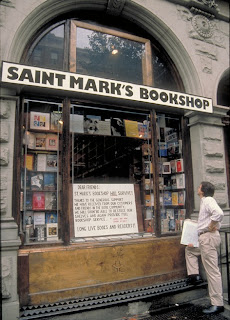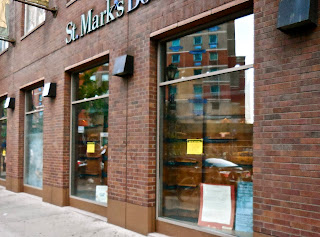The Future of St. Mark's Books
After last week's hubbub about the impending closure of St. Mark's Bookshop and the "mystery men" hoping to keep the store alive, albeit in a new form, I spoke to Rafay Khalid, who has been quietly working behind the scenes to make sure the East Village still has a bookshop here tomorrow--and for a long time.

"When I first came to New York," Khalid told me, "a friend introduced me to St. Mark's Books and it immediately became my favorite bookstore in the city. They gave small, local authors and poets a platform to have their voices heard. That's so important. It's a cultural icon and their legacy should be able to continue for the next 100 years."
Khalid has done other work "saving bookstores on nights and weekends," as he has watched shops across the country being decimated by Amazon. "We're looking at how St. Mark's 2.0 can survive Amazon," he said. "Bookstores can be the 'third place,' an idea I'm borrowing from the people at Greenlight Books in Brooklyn. There's work, home, and then the bookstore--the third place that can be the focal point of the community."
This means opening up the shop to offer a more diverse experience, with food, events, and activism, much like Red Emma's bookstore in Baltimore, which Khalid has also supported. I visited Red Emma's not long ago. When I arrived, the employees were inviting a group of homeless people inside from the cold, young queers were making lattes, and a group of activists gathered around a table to discuss gentrification. As for the books, the selection was excellent and the staff helpful.

St. Mark's earlier plea for help, 1980s
Unfortunately, it's just too late for St. Mark's Bookshop to continue. They've had nine lives and there are no more left. Investors, saviors, and neighborhood people have rescued the shop again and again. As Ada Calhoun recently pointed out in The New Yorker, the owners have been "frustratingly unwilling to seek out new streams of revenue," like events, coffee, and other customer-friendly features that have made bookstores like McNally-Jackson, Greenlight, and The Strand so successful. Now, with lawsuits, debt, and an eviction, this truly is the end.
Before their move, I fought to keep St. Mark's Bookshop at Astor Place. The thought of the East Village without St. Mark's is a depressing one, but the thought of the East Village with no (non-used) bookstore at all, is too much. Khalid, who helped St. Mark's relocate to its new space, hopes to find another indie bookstore to take over the lease.

Empty windows on Astor Place, 2014
Could Red Emma's move into the St. Mark's space? Khalid says it will more likely be a new branch of an existing New York indie bookshop. So while it looks like St. Mark's Bookshop won't be St. Mark's Bookshop anymore, with new management and a mix of old and new employees, Khalid hopes it will carry on the legacy that St. Mark's started.
As he searches for investors to take over ownership, he's looking for book lovers who want to be involved in the local community, who will continue giving voice to local writers, and who will keep the policy of accepting books on consignment from authors without distribution, one of the only ways those authors can get their books out to readers.
While the East Village still has a couple of used bookstores, we need a shop that sells new books and that functions as a cultural space, bringing readers together with living authors.
"New writers," said Khalid, "continue the tradition of the East Village and that can only be accessed through new books. That tradition is a scrappiness, an attitude of 'We're going to make it and show the world what we can do.' It goes back to the history of immigrants on the Lower East Side. The future writers of the East Village need a bookstore here."

"When I first came to New York," Khalid told me, "a friend introduced me to St. Mark's Books and it immediately became my favorite bookstore in the city. They gave small, local authors and poets a platform to have their voices heard. That's so important. It's a cultural icon and their legacy should be able to continue for the next 100 years."
Khalid has done other work "saving bookstores on nights and weekends," as he has watched shops across the country being decimated by Amazon. "We're looking at how St. Mark's 2.0 can survive Amazon," he said. "Bookstores can be the 'third place,' an idea I'm borrowing from the people at Greenlight Books in Brooklyn. There's work, home, and then the bookstore--the third place that can be the focal point of the community."
This means opening up the shop to offer a more diverse experience, with food, events, and activism, much like Red Emma's bookstore in Baltimore, which Khalid has also supported. I visited Red Emma's not long ago. When I arrived, the employees were inviting a group of homeless people inside from the cold, young queers were making lattes, and a group of activists gathered around a table to discuss gentrification. As for the books, the selection was excellent and the staff helpful.

St. Mark's earlier plea for help, 1980s
Unfortunately, it's just too late for St. Mark's Bookshop to continue. They've had nine lives and there are no more left. Investors, saviors, and neighborhood people have rescued the shop again and again. As Ada Calhoun recently pointed out in The New Yorker, the owners have been "frustratingly unwilling to seek out new streams of revenue," like events, coffee, and other customer-friendly features that have made bookstores like McNally-Jackson, Greenlight, and The Strand so successful. Now, with lawsuits, debt, and an eviction, this truly is the end.
Before their move, I fought to keep St. Mark's Bookshop at Astor Place. The thought of the East Village without St. Mark's is a depressing one, but the thought of the East Village with no (non-used) bookstore at all, is too much. Khalid, who helped St. Mark's relocate to its new space, hopes to find another indie bookstore to take over the lease.

Empty windows on Astor Place, 2014
Could Red Emma's move into the St. Mark's space? Khalid says it will more likely be a new branch of an existing New York indie bookshop. So while it looks like St. Mark's Bookshop won't be St. Mark's Bookshop anymore, with new management and a mix of old and new employees, Khalid hopes it will carry on the legacy that St. Mark's started.
As he searches for investors to take over ownership, he's looking for book lovers who want to be involved in the local community, who will continue giving voice to local writers, and who will keep the policy of accepting books on consignment from authors without distribution, one of the only ways those authors can get their books out to readers.
While the East Village still has a couple of used bookstores, we need a shop that sells new books and that functions as a cultural space, bringing readers together with living authors.
"New writers," said Khalid, "continue the tradition of the East Village and that can only be accessed through new books. That tradition is a scrappiness, an attitude of 'We're going to make it and show the world what we can do.' It goes back to the history of immigrants on the Lower East Side. The future writers of the East Village need a bookstore here."



Comments
Post a Comment